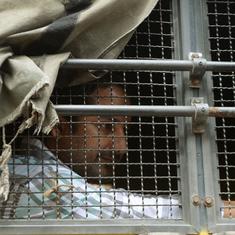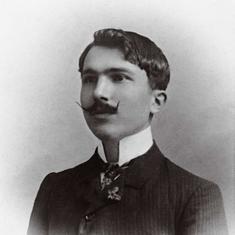Although usually categorised as “nonsense”, Sukumar (Ray)’s best work was far more complex and best approached, at least by grown-ups, as a series of commentaries, by turns satirical, philosophical, and farcical, on the world around him and “the nonsensical nature of the colonial everyday, with its yawning gaps between aspiration and reality”.
This extraordinary ability to elevate farce to satire and satire to philosophy is most obvious in his plays. Sukumar’s dramatic interests emerged early, with a childhood dramatisation of his father’s story Kenaram o Becharam and the lost anti-colonial skit Ramdhan Badhh.
His earliest extant play is Jhhalapala (1911), which depicts how a rich landowner, with the help of his old servant and a lawyer uncle, gets rid of favour-seekers and flatterers by unmalicious trickery. Even though the play is almost pure farce, the author of Ramdhan Badhh makes a cameo appearance in it, when a patriotic singer is beaten up by an entirely Indian audience because his anti-British song was obviously “seditious”.
Here, of course, Sukumar’s critique was directed not against the British but those innumerable law-abiding Indians who did their dirty work for the British purely out of unreasoning, unpatriotic fear.
Another play written around the same time, Lakshmaner Shaktishel, was more innovative. Unlike his father, he never tried his hand at a straightforward adaptation of the Ramayana but in Shaktishel, he turned that epic into a hilarious spoof The play was largely based on one specific chapter – the Lankakanda – where Lakshmana is fatally injured by Ravana’s wonder-weapon (the shaktishel of the title), and Hanuman saves his life by uprooting and transporting a whole mountain containing the one magic herb that would cure Lakshmana.
Again a one-act play with four scenes, Shaktishel turned these deadly serious events into wonderfully comic vignettes. When Lakshman collapses after being hit with the shaktishel, Ravana picks his pocket and runs away. Hanuman, reluctant to travel so many miles to get the mountain, first suggests that they try homoeopathy instead and when he does finally bring the mountain, he dumps it on Yama, the god of death, who has come to take Lakshman away. As the medicine works and Lakshmana recovers, everybody remarks that it is so potent because it is a swadeshi drug.
In Bhabuk Sabha, published in Probasi in 1914 but written earlier – Sukumar had read it out to some friends while he was in Britain – and the 1915 play Shabdakalpadrum (which was performed in Santiniketan by Sukumar on the occasion of Rabindranath Tagore’s birthday in 1917), Sukumar turned to one of his enduring interests: the bond between words (the signifier, in today’s academic jargon) and meanings (the signified).
This play and Shabdakalpadrum both argued that language itself would be destroyed and chaos ensue if words themselves were treated as more important than their meanings.
Sukumar explored this theme at greater depth in his essay Bhasar Atyachar (The Tyranny of Language, also written around 1915). Did all those who used the word “evolution” have an adequate understanding of Darwin’s theory? he wondered. Did those Englishmen who so complacently pigeon-holed Tagore’s Gitanjali as a work of “mystic idealism” understand the complexity of Tagore’s poetry?
Words, when detached from their complex significations, clouded people’s minds and beliefs, obstructing real knowledge and inspiring rash actions. “Half the battles of the world are wars of mere words,” declared Sukumar, illustrating his contention with the battles between Hindus and non-Hindus, or between “moderate” and “extremist” nationalists. The true value of language, he asserted, lay in meanings, and not, as so many people imagined, in the words themselves.
Janardan: Why do you suppose Srikhanada-babu and the rest of them didn’t turn up
Nikunja: I was told Ishen-babu here has insulted them in some way.
Ishan: What do you mean? How was it an insult? It’s easy to say these things. Let Janardan-babu here stand witness - let him tell us what kind of an insult it was.
Janardan: Why, no one said anything particularly damaging. They were only called selfish apes. But then given how impatient their behaviour was, there was nothing wrong with saying that.
Somprakash: And what if he did insult them? Does that mean you have to be completely lacking the fellow-feeling that allows you to consort with one another cordially in spite of all this?
Ishan: Of course. But that coterie of theirs is doing them in.
Janardan: Couldn’t they have given up on factionalism at least on a special day like this one?
Somprakash: Whatever you might day, I agree with what a western philosopher has said about this. I say it’s for the best that they haven’t come.
[Enter Satyabahan, bustling about]
Satyabahan: They’re here, they’re here, are you ready, any moment now. Is my notebook there, Somprakash? Come up to the front, Nikunja-babu. No never mind, move up, Ishan-babu.
Ishan: How can I move up? My song first…
Satyabahan: No, there’s no time for the song - not today. It’ll take some time to read my essay - no need to prolong things further.
Ishan: Very well. Who says you have to read your essay for that matter? Why not drop it?
Satyabahan: All right, so be it - you can have your song and music. If my essay’s such an annoyance for all of you, no need. Come on Somprakash, let us go.
Everyone: No no, what are you saying! How can we allow that?
Somprakash (brimming with emotion): Today I feel in my wistful soul each and every plea in our hearts converging from all quarters, little by little, slowly…
Janardan: Yes, that’s best. The song as well as the essay.
Nikunja: There they are.
...
— Opening lines of 'Chalachittachanchari', translated into English
Around the time of Shabdakalpadrum, Sukumar wrote another play, Chalachittachanchari. Dealing with the outwardly polite but actually petty rivalry between two groups of spiritually inclined intellectuals, the play was often regarded as a roman à clef and many tried to determine the real-life equivalents of the two opposed groups.
One of the groups was reminiscent of Rabindranath Tagore’s ashram school at Santiniketan but for some, the two warring camps were more akin to the different sects of the Brahmo Samaj or, alternatively, the Brahmo Samaj and its Hindu revivalist opponents.
But even for those who know little and care less about any of those institutions, the play is richly rewarding for the sheer comic gusto with which it sends up pseudo-intellectualism of all kinds through the apparently imbecilic responses of the central character, the seemingly naive Bhabadulal, who, the play occasionally suggests, might actually be rather sharper than he seems to be. Indeed, some of Bhabadulal’s behaviour mirrored Sukumar’s own childhood trick of pretending to be stupid in order to protect himself from unwelcome attention.
…Sukumar’s best work has a timeless appeal but not because they were located in a topsy-turvy universe far removed from the turbulence of early twentieth-century India. Sukumar’s life spanned the Boer War, the Russo-Japanese War, the swadeshi movement, the First World War, the Jallianwallah Bagh massacre, and Gandhi’s Non-cooperation Movement – years that Satadru Sen has described as “the most formative decades of middle-class Bengaliness”.
Although Sukumar was no demagogue, these events left indirect, stylised imprints on his work, especially during the First World War and the immediate post-war years, when Bengal went through a particularly turbulent period.
The oft-repeated British claims for their own fairness, liberality, and broadmindedness – believed so ardently for so long by so many Indians – was lampooned in Bhoy Peo Na, a poem about a fierce-looking animal with a huge club who tries to lure a dhoti-clad Bengali into his cave with claims of his benevolent disposition.
The poem Baburam Sapurey, written in 1921, relating the strange saga of a man wanting to demonstrate his courage by beating up snakes that did not move, bite, or run, was poking fun at the spinelessness of the new non-violent (Gandhian) nationalists. Another poem, Ekushey Ain (1922), which detailed examples of bizarre laws including one providing for the arrest of poets, must have reminded contemporary adult readers of the torrent of new laws with which the Raj sought to stifle Indian dissent in the 1920s.
Just at the time that this poem was written, the poet Nazrul Islam and his “seditious” magazines, Jugabani and Dhumketu, were attracting police attention and Nazrul was arrested within a month of the publication of Ekushey Ain. As Sibaji Bandyopadhyay has suggested, there is every reason to regard Abol Tabol and, indeed, all of Sukumar’s best-known works as attempts to construct a “counter-discourse” satirising the incongruities of colonial Bengali life through portrayals of virtually every social type populating the period, from moderate Congress politicians and radical nationalists to clerks, policemen, and other cogs in the wheel of the colonial state.
Excerpted with permission from The Rays Before Satyajit: Creativity and Modernity in Colonial India, Chandak Sengoopta, Oxford University Press.










